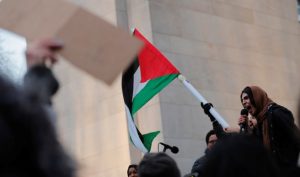Gigi Hadid recently found herself at the center of a controversy involving the Israeli government, who accused her of sharing what they perceived to be an antisemitic meme and indirectly supporting harm to innocent civilians. The dispute revolved around a message Gigi posted on her social media over the weekend, addressing the ongoing Israel-Palestine conflict.
Also Read: Who was John Colorado’s wife Gigi?
In her original post, the meme conveyed the message that “There is nothing Jewish about the Israeli government’s treatment of Palestinians. Condemning the Israeli government is not antisemitic, and supporting Palestinians is not supporting Hamas.” Gigi’s intent seemed to be to draw a distinction between political criticism and religious prejudice.
In response, the State of Israel’s official Instagram account created a counter-meme, which presented a contrasting view. Their version read, “There is nothing valiant about Hamas’ massacre of Israelis. Condemning Hamas for what it is (ISIS) is not anti-Palestine, and supporting Israelis in their fight against barbaric terrorists is the right thing to do.” The Israeli government used this post to express their perspective on the conflict.
Further directing their response towards Gigi, they tagged her in their Instagram story and questioned her about her awareness of the ongoing events. They accused her of turning a blind eye to the suffering of Jewish individuals, particularly children, in the conflict. The Israeli government conveyed a strong message that her silence reflected a particular stance on the issue.
The exchange concluded with the State of Israel emphasizing, “We see you” and sharing a powerful image depicting children’s toys and clothing beside a bloodied floor. They stated that if Gigi did not denounce this violence, her words would hold no weight. The dispute shed light on the complexities and sensitivities surrounding the Israel-Palestine conflict and the role of public figures in such discussions.







